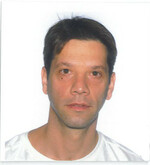About the Authors

Itai Arad
Assistant professor
Technion - Israel Institute of Technology
arad[td]itai[ta]fastmail[td]com
https://phys.technion.ac.il/en/people?view=person&id=871
Assistant professor
Technion - Israel Institute of Technology
arad[td]itai[ta]fastmail[td]com
https://phys.technion.ac.il/en/people?view=person&id=871
Itai Arad was born and raised in a Kibbutz in the south of Israel,
where the howling old owl in the woods is hunting the horny back toad.
He did his undergraduate studies in mathematics and physics
at Tel Aviv University (B.Sc. 1996), and later his Ph.D. studies
at the Weizmann Institute of Science
under the supervision of
Itamar Procaccia
in the subject of
turbulence (Ph.D. 2001). After graduation he decided to study astrophysics, by taking a postdoc
position at the Institute of Astronomy at the
University of Cambridge, UK.
He finally found his favourite research area with the help of
Dorit Aharonov,
who introduced him to the subject of Quantum Computation.
After a postdoc in Berkeley with
Umesh Vaziarani
and
some happy years at the
Centre of Quantum Technologies (CQT)
in Singapore, he is now an Assistant Professor at the faculty of Physics at
the Technion in Israel.
His research interests lie mainly in the intersection of condensed matter
physics and quantum information, including Hamiltonian Complexity, and
questions about
area laws and tensor networks.
![Miklos Santha\footnotemark[1]](santha.jpg)
Miklos Santha
Directeur de Recherche
Université Paris Diderot
miklos[td]santha[ta]gmail[td]com
https://www.irif.fr/~santha/
Directeur de Recherche
Université Paris Diderot
miklos[td]santha[ta]gmail[td]com
https://www.irif.fr/~santha/
Miklos Santha received his Diploma in mathematics in 1979 from Eötvös University in Budapest, and his Ph.D. in mathematics in 1983 from the Université Paris 7. His advisor was Jacques Stern. Since 1988 he has been a CNRS researcher, currently at the Université Paris Diderot, IRIF. He is also a principal investigator at CQT in Singapore.
![Aarthi Sundaram\footnotemark[1]](sundaram.jpg)
Aarthi Sundaram
Hartree postdoctoral fellow
Joint Centre for Quantum Information and Computer Science
University of Maryland
aarthims[ta]gmail[td]com
quics.umd.edu/people/aarthi-sundaram
Hartree postdoctoral fellow
Joint Centre for Quantum Information and Computer Science
University of Maryland
aarthims[ta]gmail[td]com
quics.umd.edu/people/aarthi-sundaram
Aarthi Sundaram hails from India, the land of diversity and contrasts.
She received a B.E. in Computer Science and M.Sc. in Mathematics from the
Birla Institute of Technology and Science
at their Goa campus in 2012. An elective course offered by
Dr. Radhika Vatsan, during her undergraduate studies, introduced her to the world of
Quantum Computing and provided the impetus to pursue research in this subject.
She completed her Ph.D. at the
Centre of Quantum Technologies (CQT)
in 2017 in Singapore under the guidance of
Miklos Santha.
She is currently a Hartree Postdoctoral Fellow at the
Joint
Center for Quantum Information and Computer Science
at the University of Maryland.
Her research interests span classical and quantum complexity theory,
including quantum algorithms,
cryptography,
Hamiltonian Complexity, and ideas pertaining to a quantum polynomial hierarchy.
Outside of work she is an avid Formula 1 and racing enthusiast, and loves
to peer through her camera lens to capture landscapes, architecture
and moments.
![Shengyu Zhang\footnotemark[1]](zhang.jpg)
Shengyu Zhang
Assistant professor
The Chinese University of Hong Kong
syzhang[ta]cse[td]cuhk[td]edu[td]hk
www.cse.cuhk.edu.hk/~syzhang
Assistant professor
The Chinese University of Hong Kong
syzhang[ta]cse[td]cuhk[td]edu[td]hk
www.cse.cuhk.edu.hk/~syzhang
Shengyu Zhang received his B.S. in Mathematics at
Fudan University in 1999,
his M.S. in Computer Science at
Tsinghua University
under the supervision of
Mingsheng Ying
in 2002, and his
Ph.D. in Computer Science at Princeton University under the supervision of
Andrew Chi-Chih Yao in 2006.
He then worked at
NEC Laboratories America for a summer,
and at the
California Institute of Technology
for two years as a postdoctoral researcher. In 2008, he joined
The Chinese University of Hong Kong
where he is now an associate professor. His main research
interests are algorithms and complexity theories in various quantum and
randomized models.
